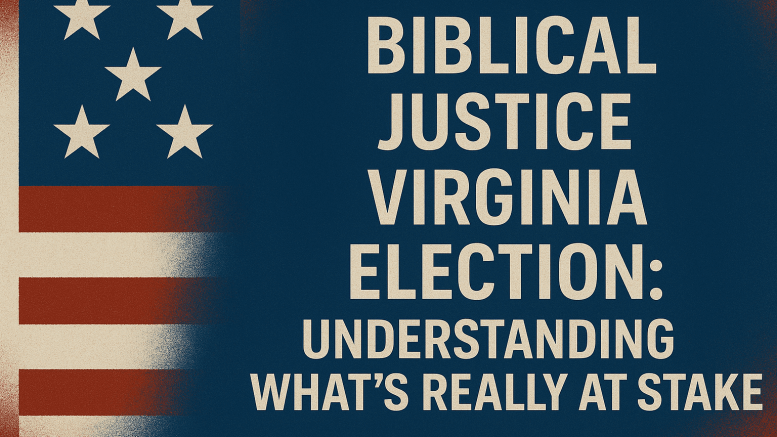Dear Christian:
As we continue our series on Virginia Christian voters for the upcoming election, today we’re examining a concept that’s been hijacked, redefined, and weaponized: justice.
You’ve heard the terms everywhere: “social justice,” “racial justice,” “economic justice,” “environmental justice.” Politicians promise it. Activists demand it. Universities teach it. Churches preach it. However, what most people call “justice” today bears little resemblance to what the Bible calls justice.
This is no longer about fairness—it’s about redefining justice itself.
Moreover, the biblical justice Virginia election on November 4th will determine which definition of justice shapes our laws, our schools, our economy, and our culture. One vision is grounded in Scripture’s eternal principles. The other is rooted in Marxist ideology that contradicts God’s Word at every level.
The reality is that most Christians don’t recognize the difference. Consequently, they support policies that sound compassionate but actually violate biblical justice. Furthermore, they vote for candidates who promise “justice” while implementing injustice.
Today, we’re going to fix that. You’ll learn what biblical justice actually means, how it differs from modern “social justice,” and why this matters enormously in the biblical justice Virginia election.
What the Bible Says About Justice: Four Foundational Principles
Let’s start with Scripture. Biblical justice rests on four pillars that appear consistently throughout God’s Word:
1. Equality Before the Law
The first principle of biblical justice is that every individual stands equal before the law. No partiality. No favoritism. No special treatment based on wealth, poverty, race, or status.
God commanded Israel: “You shall do no injustice in court. You shall not be partial to the poor or defer to the great, but in righteousness shall you judge your neighbor.” (Leviticus 19:15)
Notice what this means. Biblical justice treats the poor man and the rich man equally. It doesn’t favor the wealthy because of their influence. However, it also doesn’t favor the poor because of their victim status. Instead, both stand equal before the law.
This is radical. Modern “social justice” explicitly rejects this principle. It argues that true justice requires favoring certain groups (the “oppressed”) over others (the “oppressors”). Consequently, it demands unequal treatment to achieve equal outcomes.
However, Scripture says the opposite. Equal treatment under law is justice. Unequal treatment—even with good intentions—is injustice.
2. Equal Restitution for Equal Harm
Biblical justice demands that punishment fit the crime. The restitution for harm must be proportional, not excessive or lenient.
“But if there is harm, then you shall pay life for life, eye for eye, tooth for tooth, hand for hand, foot for foot, burn for burn, wound for wound, stripe for stripe.” (Exodus 21:23-25)
Modern readers often misunderstand this principle. They think “eye for eye” sounds harsh. In fact, it was revolutionary mercy. Before this law, revenge was unlimited. If you poked out my eye, I might kill your entire family. Therefore, God said: “No. The punishment must match the crime. No more, no less.”
This principle matters enormously in the biblical justice Virginia election. Consider:
Reparations for slavery: Modern “social justice” says descendants of slaveholders owe debts to descendants of slaves—even though neither the debtors nor the creditors participated in slavery. However, biblical justice says the actual perpetrator owes restitution to the actual victim. Punishing someone for their ancestor’s sin violates “eye for eye” because the person being punished committed no crime.
Affirmative action and quotas: These policies punish or reward people based on their group identity rather than their individual actions. Consequently, they violate equal restitution because they penalize innocent people (those denied opportunities due to race) and reward people who suffered no personal harm.
3. Individual Responsibility, Not Group Guilt
This is where biblical justice most sharply contradicts modern “social justice.” Scripture is unambiguous: Each person bears responsibility for their own sin, not their group’s, ancestor’s, or race’s sin.
God declared through the prophet Ezekiel:
“The soul who sins shall die. The son shall not suffer for the iniquity of the father, nor the father suffer for the iniquity of the son. The righteousness of the righteous shall be upon himself, and the wickedness of the wicked shall be upon himself.” (Ezekiel 18:20)
This principle is foundational to biblical justice. You are responsible for your choices. Furthermore, you are not responsible for your father’s choices, your race’s history, or your nation’s past sins. Likewise, you don’t inherit righteousness from your ancestors. Each person stands before God individually.
However, modern “social justice” rejects this entirely. It divides society into oppressor groups and oppressed groups. Then it assigns collective guilt to “oppressor” groups (white people, men, heterosexuals, Christians) and collective victimhood to “oppressed” groups (racial minorities, women, LGBTQ+ individuals, non-Christians).
Consequently, under “social justice,” you can be guilty simply because of your skin color, gender, or beliefs—regardless of your individual actions. Conversely, you can claim victim status regardless of your individual circumstances.
This directly contradicts Ezekiel 18:20. Biblical justice judges individuals. “Social justice” judges groups.
4. God Rewards Merit, Not Equal Outcomes
Finally, biblical justice is not concerned with equality of outcomes. God does not redistribute success to ensure everyone ends up equal. Instead, He rewards faithfulness, diligence, and wise stewardship—even when that creates unequal results.
Jesus made this clear in the Parable of the Minas:
“And he said to those who stood by, ‘Take the mina from him, and give it to the one who has the ten minas.’ And they said to him, ‘Lord, he has ten minas!’ I tell you that to everyone who has, more will be given, but from the one who has not, even what he has will be taken away.” (Luke 19:24-26)
The crowd protested: “Lord, that’s not fair! The one with ten already has more!” However, Jesus insisted that the faithful servant deserves more reward, even though it creates greater inequality.
This principle matters in the biblical justice Virginia election because modern “social justice” obsesses over equal outcomes. It measures justice by statistics: Are all racial groups equally represented in universities, corporations, and government? Do all groups have equal income, wealth, and success?
However, biblical justice doesn’t expect equal outcomes. Different people make different choices, exercise different levels of diligence, and develop different skills. Consequently, outcomes vary. That’s not injustice—it’s reality in a fallen world where people have genuine freedom and responsibility.
The Marxist Redefinition: How “Social Justice” Contradicts Scripture
Now let’s examine where modern “social justice” comes from. Most Christians assume it’s simply applying biblical principles to contemporary problems. In reality, “social justice” ideology has Marxist roots that directly contradict Scripture.
Karl Marx taught: “The history of all hitherto existing societies is the history of class struggles. Freeman and slave, patrician and plebeian, lord and serf, guild-master and journeyman, in a word, oppressor and oppressed, stood in constant opposition to one another.”
Notice Marx’s framework: All of history is a struggle between oppressor classes and oppressed classes. Society divides into two groups locked in conflict. Justice comes through revolution—the oppressed must overthrow the oppressors and redistribute power and resources.
Furthermore, Marx rejected individual responsibility in favor of group classifications. Under Marxism, individuals matter only as members of classes. Your guilt or innocence depends on which class you belong to. Consequently, if you’re in the “oppressor” class, you’re guilty—regardless of your personal actions.
This is the foundation of modern “social justice” movements, including Critical Race Theory (CRT). CRT applies Marx’s class struggle framework to race, declaring that all of American history is white people (oppressors) versus people of color (oppressed). Therefore, justice requires tearing down “white supremacy” systems and redistributing power, wealth, and opportunity based on race.
Here’s the critical point for the biblical justice Virginia election:
This framework contradicts every principle of biblical justice:
- Instead of equality before law → It demands unequal treatment to favor “oppressed” groups
- Instead of equal restitution → It demands reparations from people who committed no crime to people who suffered no direct harm
- Instead of individual responsibility → It assigns guilt based on group membership (race, gender, sexuality)
- Instead of merit-based outcomes → It demands equal outcomes regardless of individual choices and performance
Consequently, when candidates promise “social justice,” “racial justice,” or “equity,” you must ask: Are they promoting biblical justice or Marxist-based group guilt and forced equality of outcomes?
How This Plays Out in the Biblical Justice Virginia Election
The platforms speak for themselves. Let’s compare what Virginia voters will choose on November 4th:
Republican Platform on Biblical Justice Virginia Election Issues:
“God bestows certain inalienable rights on every individual, thus producing human equality.”
“[We will ensure] that all Americans stand equal before the law.”
“We continue to encourage equality for all citizens and access to the American Dream. Merit and hard work should determine advancement in our society, so we reject unfair preferences, quotas, and set-asides as forms of discrimination.”
Our take: This aligns with biblical justice—individual rights, equality before law, merit-based advancement, and rejection of group-based preferences.
Democratic Platform on Biblical Justice Virginia Election Issues:
“[We] are committed to standing up to racism and bigotry… and recognize that race-neutral policies are not sufficient to rectify race-based disparities. We will take a comprehensive approach to embed racial justice in every element of our governing agenda.”
“We believe Black lives matter, and will establish a national commission to examine the lasting economic effects of slavery, Jim Crow segregation, and racially discriminatory federal policies on income, wealth, educational, health, and employment outcomes.”
“[We will] employ guidance counselors, social workers, nurses, or school psychologists to help guarantee age-appropriate and racially equitable student disciplinary practices.”
Our take: This explicitly rejects race-neutral policies (equality before law) and instead seeks equality of outcomes based on race and gender. It pledges to study reparations (group guilt), promote racial group responsibilities, and use innovative strategies to redistribute wealth to close racial wealth gaps.
The Contrast for Biblical Justice Virginia Election:
One platform says: Treat everyone equally under law. Judge individuals by their actions. Let merit determine outcomes.
The other says: Race-neutral policies are insufficient. We need race-based policies to achieve racial equity. Study reparations. Guarantee racially equitable outcomes.
One promotes biblical justice. The other promotes “social justice” that contradicts Scripture’s principles.
Why This Biblical Justice Virginia Election Issue Matters for Your Family
Let’s make this personal. How does the winner of the biblical justice Virginia election affect your daily life?
For Your Children’s Education:
If Virginia embraces “social justice” ideology, your children will be taught:
- They’re either oppressors or oppressed based on their skin color
- America is fundamentally racist and must be torn down
- Equality before law is insufficient—we need equity (equal outcomes)
- They should feel guilty for their race, or victimized by it
However, if Virginia maintains biblical justice principles, your children learn:
- Every individual has equal dignity as God’s image-bearer
- Judge people by character, not color (Martin Luther King Jr.’s dream)
- Personal responsibility and merit matter
- America’s founding ideals are worth preserving and improving
For Your Workplace:
“Social justice” policies in Virginia businesses would mean:
- Mandatory diversity training teaching white privilege and systemic racism
- Hiring quotas based on race and gender, not qualifications
- Promotion decisions influenced by diversity metrics, not merit
- Fear of speaking biblical truth lest you be labeled “racist” or “bigoted”
Biblical justice in Virginia businesses means:
- Equal opportunity for all, regardless of race
- Hiring and promotion based on qualifications and performance
- Protection for religious conviction and free speech
- Freedom to succeed through diligence and competence
For Your Tax Burden:
“Social justice” fiscal policies would mean:
- Increased taxes to fund reparations and wealth redistribution programs
- Resources allocated by group identity rather than need
- Economic penalties for success (progressive taxation to achieve equity)
Biblical justice fiscal policies mean:
- Equal tax rates regardless of income level (like Israel’s tithe—10% for everyone)
- Resources allocated based on genuine need, not group membership
- Economic freedom to work, earn, save, and steward resources according to God’s design
For Your Church:
If “social justice” ideology dominates Virginia, churches face:
- Pressure to embrace CRT and preach “racial justice”
- Accusations of “white supremacy” for teaching biblical justice
- Potential loss of tax-exempt status for “discriminatory” biblical teaching
- Division along racial and political lines
If biblical justice prevails, Virginia churches can:
- Preach the whole counsel of God without government interference
- Unite around biblical truth rather than political ideology
- Practice genuine reconciliation through the gospel, not forced equity
- Maintain biblical standards without being labeled hate groups
This is what’s at stake in the biblical justice Virginia election.
What Virginia Candidates Believe About Justice
So where do Virginia’s gubernatorial candidates stand on biblical justice versus “social justice”?
This is precisely what you need to research before the biblical justice Virginia election on November 4th. Specifically, examine:
Do they support race-neutral policies or race-based policies?
- Do they believe in equality (equal treatment) or equity (equal outcomes)?
- Will they implement quotas, preferences, and set-asides based on race and gender?
- Do they support studying reparations for slavery?
Do they embrace individual responsibility or group guilt?
- Do they talk about “systemic racism” and “white privilege”?
- Do they assign blame or victimhood based on group identity?
- Will they mandate CRT-based training in schools and government?
Do they promote merit-based advancement or forced equality?
- Do they believe success should be earned or redistributed?
- Will they use government power to close “wealth gaps” and ensure equal outcomes?
- Do they trust free markets or prefer government control of economic outcomes?
Visit the Virginia Christian Voter Guide and examine:
- Candidates’ statements on racial justice and equity
- Their voting records on race-based policies
- Endorsements from groups promoting CRT or biblical principles
- Specific proposals for education, hiring, and economic policy
Furthermore, don’t just accept vague promises about “justice” or “fairness.” Demand specifics: Which definition of justice do they embrace? Biblical or Marxist?
A Warning to Virginia Christians
Here’s where I need to speak directly, Christian to Christian.
Many believers have been deceived into supporting “social justice” because it sounds like applying biblical compassion to modern problems. However, compassion without truth is not biblical. Moreover, supporting policies that violate God’s principles of justice—no matter how compassionate they sound—is not loving your neighbor.
Consider these hard truths:
Reparations violate Ezekiel 18:20. Punishing people for their ancestors’ sins contradicts Scripture, even if it’s repackaged as “restorative justice.”
Racial quotas violate Leviticus 19:15. Treating people unequally based on skin color is injustice, even if it’s called “equity.”
Group guilt violates individual responsibility. Judging someone by their race rather than their character contradicts biblical justice, even if it’s labeled “anti-racism.”
Forced equality of outcomes violates Luke 19:24-26. Redistributing success to ensure equal results contradicts God’s design, even if it’s called “closing gaps.”
Therefore, when you vote in the biblical justice Virginia election, you’re not choosing between two acceptable Christian positions. You’re choosing between biblical justice and a counterfeit that contradicts Scripture.
Consequently, this is a test of whether you’ll obey God or conform to cultural pressure.
“Do not be conformed to this world, but be transformed by the renewal of your mind, that by testing you may discern what is the will of God, what is good and acceptable and perfect.” (Romans 12:2)
Your Action Steps for the Biblical Justice Virginia Election
Here’s what you must do before November 4th:
Step 1: Study These Scriptures Read and meditate on:
- Leviticus 19:15 (equality before law)
- Exodus 21:23-25 (equal restitution)
- Ezekiel 18:20 (individual responsibility)
- Luke 19:24-26 (merit-based outcomes)
Ask God to ground your understanding of justice in His Word, not culture’s definitions.
Step 2: Research Candidates on Justice Issues Visit the Virginia Christian Voter Guide and examine where candidates stand on:
- Race-neutral vs. race-based policies
- Equity vs. equality
- Reparations and wealth redistribution
- Critical Race Theory in education
- Merit-based vs. quota-based systems
Step 3: Teach Your Family Biblical Justice Don’t let schools, media, and culture define justice for your children. Instead, teach them:
- Every person is made in God’s image—that’s the basis of human equality
- Individual character and choices matter more than group identity
- Justice means equal treatment under law, not equal outcomes
- God rewards faithfulness and diligence, even when it creates inequality
Step 4: Pray for Virginia Pray that God would:
- Give Virginia leaders who understand and implement biblical justice
- Protect Virginia children from ideologies that contradict Scripture
- Expose the lies of “social justice” and reveal truth
- Bring genuine reconciliation through the gospel, not forced equity
Step 5: Vote Biblical Justice in Virginia Election On November 4th, vote for candidates who will implement biblical justice principles in Virginia law, education, and policy. Furthermore, help others understand the difference between biblical justice and its counterfeit.
Tomorrow: Marriage, Gender, and God’s Design
The biblical justice Virginia election is intrinsically connected to tomorrow’s topic: marriage, gender, and sexuality. Why? Because “social justice” ideology doesn’t stop with race and economics. It also demands we embrace new definitions of marriage, gender, and family.
Tomorrow, we’ll examine Virginia’s marriage amendment and what candidates believe about God’s design for marriage, gender identity, and human sexuality.
These issues all connect. When government rejects biblical justice, it opens the door to rejecting all of God’s moral law. Consequently, the stakes on November 4th couldn’t be higher.
“Righteousness exalts a nation, but sin is a reproach to any people.” (Proverbs 14:34)
Virginia is choosing between righteousness and reproach. Therefore, choose biblical justice.
Research Candidates Now: Virginia Christian Voter Guide
We welcome thoughtful and respectful dialogue from all viewpoints. Comments must remain civil, relevant, and free of profanity, personal attacks, or mockery of Christian faith. Disagreement is allowed—disrespect is not.





